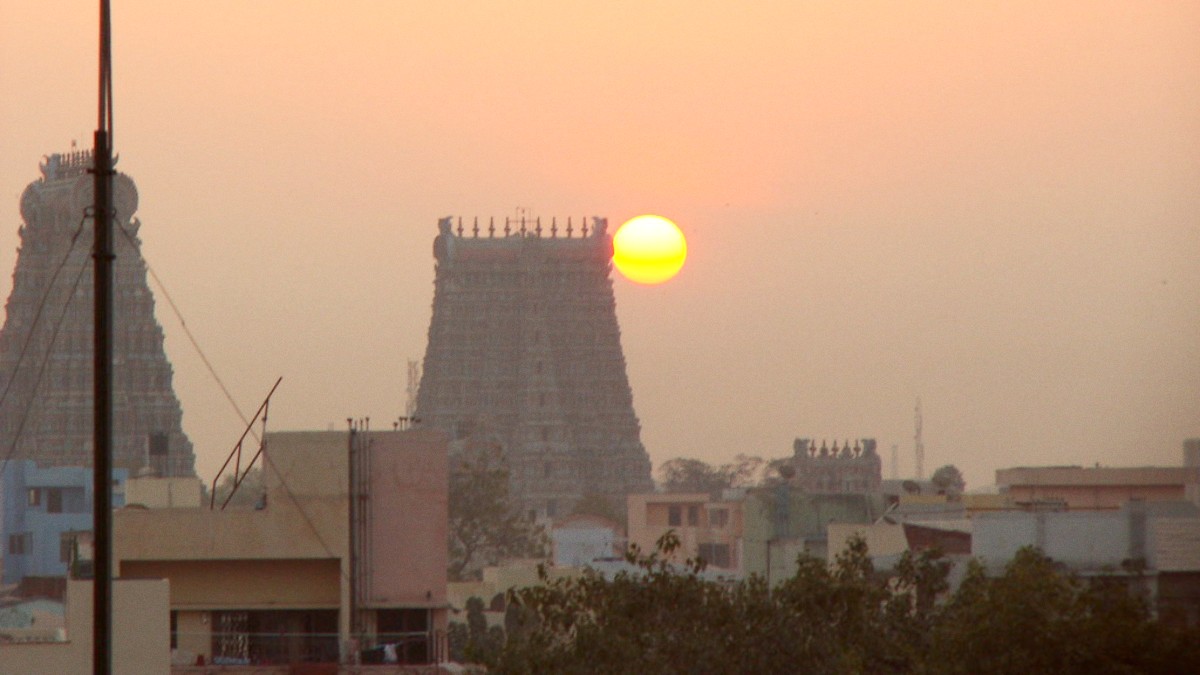
Tamil Nadu, India
This guide details practical information for your Madurai visit. You find information on travel timing, packing, accommodation, and local culinary experiences. Prepare for a memorable journey to a city where history dwells alongside modern life.
Madurai is in the southern part of Tamil Nadu, a state located on India's southeastern coast. The city sits on the banks of the Vaigai River. The city is about 464 kilometers southwest of Chennai, the state capital. Madurai holds an elevation of about 101 meters above sea level. Its inland location presents a distinct climate compared to coastal regions.
The Vaigai River provides water for agriculture and sustains the city's population. Though often dry in parts, the river's presence is historical and symbolic. It shaped the city's layout and supported its growth into a major urban center. Madurai's flat plains extend outwards from the river, dotted with small hills in the distance. These hills, like Samanar Malai, present historical insights and scenic views. The city gains from its location in a fertile plain, contributing to its historical prosperity. The city's urban sprawl has expanded over time, but the ancient core centers around the Meenakshi Amman Temple. Major transport hubs, like the railway station and bus stands, locate centrally, making arrival and departure straightforward. Madurai serves as a gateway to other regional destinations, with good road and rail connections to nearby towns and cities in Tamil Nadu and Kerala.
Madurai's past is rich and long, establishing it as one of India's oldest continuously inhabited cities. Its recorded history dates back over 2,500 years. The city served as the capital of the powerful Pandya Kingdom for many centuries. This dynasty ruled parts of South India from at least the 4th century BCE. Under Pandya rule, Madurai became a prominent trade center. Merchants from Rome and Greece visited, seeking spices, pearls, and fine textiles. This trade brought prosperity and cultural exchange.
The city is a cradle of Tamil literature and learning. The Sangam period, a golden age of Tamil literature, flourished here. Many literary academies, known as Sangams, convened in Madurai. They fostered the creation of extensive Tamil poetry and grammar. This literary heritage continues to shape Tamil identity. Madurai's identity connects deeply to its temples. The Meenakshi Amman Temple, a masterpiece of Dravidian architecture, presents its most famous symbol. Its construction and continuous embellishment over centuries reflect the city's devotion and artistic achievements. This temple has been a pilgrimage site for hundreds of years. The city's nickname, "Temple City," stems from this deep religious connection. Madurai bided invasions and changes in rule, but its cultural and spiritual core remained strong. Its historical layers offer a compelling narrative for visitors.
Over 2,500 years of recorded history.
Ruled South India from the 4th century BCE.
Visited by Roman and Greek merchants.
Golden age of Tamil literature and academies.
A masterpiece of Dravidian architecture and pilgrimage site.
Madurai is a city where every corner tells a story. Seek out the small details in the architecture and the daily lives of the people. Madurai's history is not just in museums; it finds visibility in the architecture, the customs, and the daily rituals across the city.
Auto-rickshaws, ride-sharing apps, and local buses are common transport modes in Madurai. They offer various options for moving around the city.
Madurai is known for traditional South Indian vegetarian food. Local specialties like Jigarthanda and Madurai Parotta highlight the city's culinary offerings.
Its long history, impressive temples, and distinct culture create a compelling destination. Prepare to find a city that lives its traditions every day. Your visit will surely present lasting memories of South India.
A quick reference for information about Madurai.
Madurai, located in Southern Tamil Nadu, India, finds itself bisected by the Vaigai River. Its main attraction, the Meenakshi Amman Temple, is a renowned landmark. The city boasts over 2,500 years of recorded history, serving as the capital of the ancient Pandya Kingdom. Madurai is a position as a main center of Tamil culture, literature, art, and architecture. Its nickname, "Temple City," stems from its numerous historical temples. The climate is hot and humid for most of the year, with a pleasant winter season. The currency is the Indian Rupee (INR). Tamil is the local language, while English finds understanding in tourist areas.
Tamil, with English understood in tourist areas.
Indian Rupee (INR).
Hot and humid most of the year, with a pleasant winter.
Madurai is a main position as a center of Tamil culture, literature, art, and architecture. Its historical depth makes it an unique destination.